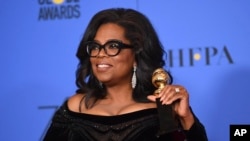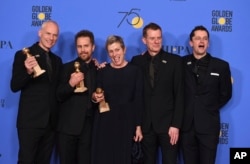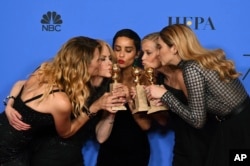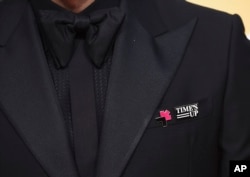The red carpet was flooded with black gowns and suits Sunday night at the 75th Golden Globes ceremony in Los Angeles.
Actors, activists and others chose to make a color-coordinated statement of female empowerment. Sunday’s ceremony was the first major awards celebration since the anti-sexual harassment movement and the #MeToo campaign exploded last October.
Oprah Winfrey described the night’s feel in her speech to accept the Cecil B. DeMille Award for lifetime achievement. She is the first black woman to receive the lifetime achievement award.
“For too long women have not been heard or believed if they dared to speak their truth to the power of those men...but their time is up. Their time is up!”
Winfrey’s speech received a loud, ongoing standing ovation.
Movie star Natalie Portman took the stage after Winfrey’s speech. She announced the nominees for best director. Portman spoke into the camera with an icy look and noted that the list was “all-male.”
The Hollywood Foreign Press Association selects the Golden Globe nominees and winners.
Former producer Harvey Weinstein long ruled at the Golden Globes. But accusations of sexual abuse against him forced his resignation in October from the company he founded. And it led to a continuing flow of similar accusations, resignations and dismissals of powerful men in Hollywood and beyond.
Three Golden Globes for Three Billboards
The movie that won the most Golden Globes was Three Billboards Outside Ebbing, Missouri. Many say it is a film that speaks directly to the current moment in Hollywood – and elsewhere.
It centers on a character who seeks justice for the rape and murder of her daughter. Frances McDormand, who plays the mother, took home the award for best actress. Writer-director Martin McDonagh accepted the Golden Globe for best screenplay. And Sam Rockwell won for best supporting actor.
The Hollywood Foreign Press also honored Three Billboards with the award for best picture-drama, one of the night’s biggest prizes.
Comedian Seth Meyers hosted the awards show. He opened the night with jokes about the Hollywood sexual harassment and abuse scandals. “Good evening ladies and remaining gentlemen,” he began. The joke seemed to serve as a pressure release.
“For the male nominees in the room tonight, this is the first time in three months it won’t be terrifying to hear your name read out loud."
'The power of women'
The first award of the night went to Nicole Kidman. She won for her performance in HBO’s Big Little Lies. She also produced the series with co-star Reese Witherspoon. Kidman credited the win to “the power of women.”
Big Little Lies was nominated for six Golden Globes. It won four, including best supporting actress in a limited series or television movie for Laura Dern. Dern walked the red carpet with women’s rights activist Monica Ramirez. Several other actors arrived with activists as well. Michelle Williams attended with “Me Too” founder Tarana Burke. Meryl Streep came with domestic worker activist Ai-jen Poo.
It was all part of an effort to keep the ceremony’s focus on sexual harassment.
Other winners continued the theme. Amazon’s current hit series The Marvelous Mrs. Maisel, won best TV series comedy. The show follows a 1950s housewife who begins a stand-up comedy career. Its star, Rachel Brosnahan, won best actress in a musical or comedy series.
And Elisabeth Moss accepted the award for best actress in a drama series. She won for her performance in Hulu’s The Handmaid’s Tale. The television series is based on the novel by Canadian writer and feminist Margaret Atwood. The book describes a dystopian future in which women are forced into single, narrow roles, such as childbearers, wives or cooks.
The Handmaid’s Tale was also honored with the Golden Globe for best TV series - drama.
In her acceptance speech, Moss dedicated the award to Atwood. She said, “We no longer live in the gaps between the stories. We are the stories in print and we are writing the stories ourselves.”
'I'm being seen for who I am'
Sunday night’s black-dress demonstration was part of the recently formed movement called Time’s Up. The campaign is made up of hundreds of women in the entertainment industry. They have joined forces to demand gender equality in the workplace and to provide legal defense aid for sexual harassment victims.
Nearly everyone was dressed in black Sunday night. Many also wore a Time’s Up pin. Television star Chris Sullivan from This is Us even painted his fingernails black. His co-star Sterling K. Brown won for best actor in a TV series - drama. Brown, the first black man to win the award, thanked This is Us creator Dan Fogelman.
“You wrote a role for a black man that can only be played by a black man. And so, what I appreciate so much about this thing is that I’m being seen for who I am and being appreciated for who I am. And it makes it that much more difficult to dismiss me or dismiss anybody who looks like me. So thank you, Dan!"
Though the atmosphere was still fun, the red carpet had unusually serious exchanges. For example, actor Debra Messing was being interviewed by the E! network when she criticized the network itself for pay inequality.
E!’s Catt Sadler recently left the network after she said she learned she was making about half the pay of her male co-host, Jason Kennedy.
Caty Weaver adapted this story for Learning English based on AP news reports. Ashley Thompson was the editor.
Write to us in the Comments Section or on our Facebook page.
________________________________________________________________
Words in This Story
red carpet – n. a long narrow red cloth stretched on the ground on which honored guests are to walk
gown – n. a long, formal dress that a woman wears especially during a special event
suit – n. a set of clothes that usually consists of a jacket and a skirt or pair of pants that are made out of the same material
coordinate – v. to cause (two or more things) to be the same or to go together well : to cause (two or more things) to not conflict with or contradict each other
harassment – n. repeated attacks against someone
ovation – n. an occurrence in which a group of people at a play, speech, sporting event, etc., show enthusiastic approval or appreciation by clapping their hands together over and over
host – n. to be the main person who entertains guests
scandal – n. an occurrence in which people are shocked and upset because of behavior that is morally or legally wrong
domestic – adj. relating to the work (such as cooking and cleaning) that is done in a person's home
stand-up comedy – n. single person performances of humorous material presented to a live audience
dystopian – adj. an imaginary place where people are unhappy and usually afraid because they are not treated fairly
childbearer – n. a person who carries a pregnancy and gives birth









